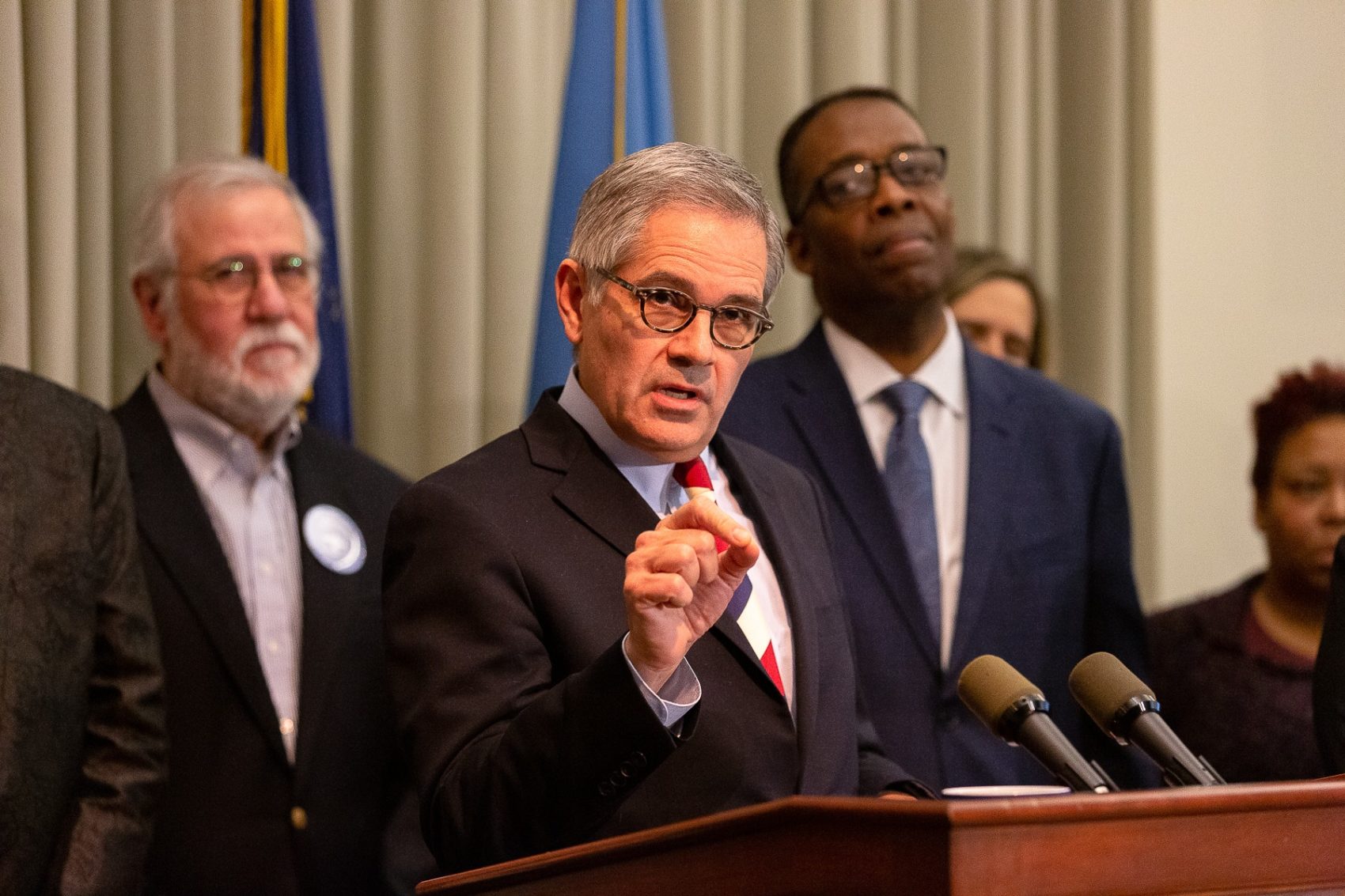Pennsylvania Democrats Had a Chance to Reject Law Limiting Philly D.A.’s Authority
Lawmakers say Republicans used deceptive tactics to pass the controversial bill. The legislative record tells a different story.

On July 2, Pennsylvania Governor Tom Wolf signed into law a bill that includes a controversial provision to strip progressive Philadelphia District Attorney Larry Krasner of some prosecuting power over gun cases in the city. The measure, passed in late June by the Republican-led state legislature, gives state Attorney General Josh Shapiro’s office the ability to prosecute cases involving the illegal possession and illegal sale of firearms in the city—without first conferring with Krasner.
Since its enactment, some Democratic lawmakers who oppose the provision have portrayed it as a surprise last-minute maneuver by their Republican colleagues, who they say sneaked it into an otherwise innocuous bill during the yearly scramble to pass a budget. The original bill allowed police to work outside their areas of jurisdiction if they serve as members of federal, state, or local task forces, but was amended to include the provision concerning Krasner and Shapiro.
Lawmakers told The Intercept that they were unaware of what they had voted for and suggested Republicans were attacking Krasner’s power under cover of night. “This bill as amended by Republican Philly state rep. Martina White was an early Christmas present to the [Fraternal Order of Police] and the Attorney General who can now do an end-run [on] our duly elected district attorney and the criminal justice reforms his office is implementing,” Representative Christopher Rabb of Philadelphia told The Intercept in a statement. Rabb also described the bill to the Philadelphia Inquirer as a “poison pill” and a “legislative boondoggle,” and said it was part of a “backroom agenda of the special interest groups” aiming to strip Krasner of power.
But Rabb and more than 90 other House Democratic members voted twice to approve the measure. On June 18, Rabb voted to approve White’s amendment, which was less than two pages long and offered on the House floor. A day later, he again voted to approve the full bill and to send it over to the Senate, where it received minor changes to the original language and was passed unanimously. Finally, on June 28, Rabb was one of only three House members, all Democrats, who voted against the bill before it was sent to Wolf.
Every representative on the floor that day should have been well aware of what the amendment did and what they were voting for.
Will Patterson spokesperson, Rep. Martina White
When asked whether he felt blindsided by the passage, if he knew what was in the bill when he voted for it, and whether he raised concerns about it prior to the bill becoming law, Rabb said he said he had “no interest in relitigating votes taken on HB 1614,” the official name of the bill. He said he was now focused on ensuring accountability and transparency for the additional $2.5 million provided in the June budget to the Gun Violence Task Force—a coordinated effort between Shapiro and Krasner’s offices aimed at reducing the illegal possession and sale for firearms.
Will Patterson, a spokesperson for White, told The Appeal that White introduced the amendment in the required amount of time to allow it to be distributed to all representatives and even spoke on the House floor before it was brought up for a vote. The legislative record shows that White submitted the amendment on June 17 and a vote was not taken until a little after 3 p.m. a day later.
“Every representative on the floor that day should have been well aware of what the amendment did and what they were voting for,” Patterson said. “If they had questions, they could have asked on the House floor prior to voting on the amendment.”
White’s amendment is drawn from a stand-alone bill she introduced in June. That bill would allow Shapiro to prosecute gun cases across the state, as opposed to just in Philadelphia. It is not time-limited like the HB 1614 amendment, which expires in two years, coinciding with the end of Krasner’s first term. Patterson said the amendment was meant to be a pilot program and that White’s statewide bill was still awaiting consideration by the House Judiciary Committee.
Patterson said it was important to bring in extra resources to prosecute gun cases because the city needs “all hands on deck to make sure criminals are being held accountable.” However, The Appeal reviewed all of the criminal dockets filed in the Philadelphia municipal court between 2016 and 2018, Krasner’s first year in office, and found roughly the same number of cases were filed after Krasner took office as were filed in the years prior.
Organizers confronted Shapiro about the new law this month at Netroots Nation, a progressive political convention in Philadelphia. “Our community worked hard to elect Larry Krasner,” Marthea Brown, an organizer with the Coalition to Abolish Death by Incarceration, told Shapiro. “And finally we have someone in power who believes in justice. Who believes in reviewing cases. Who believes in treating people fair. We won’t let you take that away from us. This is about the people, not the power.”
Shapiro publicly vowed to not use his newly issued power. “I didn’t ask for this law, I don’t want this law,” he told organizers. “If legislators want to repeal this law, that is certainly fine with me,” he added.
